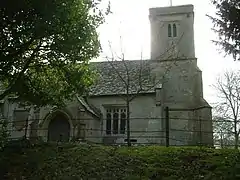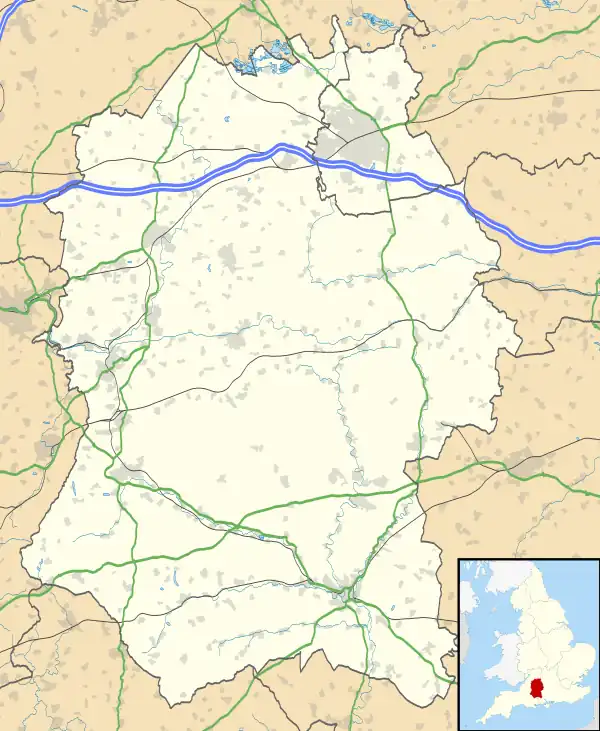Calstone
Calstone is a former tithing and manor in Wiltshire, England, lying southeast of Calne and adjacent to Calstone Wellington.
| Calstone | |
|---|---|
 Church of St. Mary, Calstone | |
 Calstone Location within Wiltshire | |
| OS grid reference | SU022691 |
| Civil parish | |
| Unitary authority | |
| Ceremonial county | |
| Region | |
| Country | England |
| Sovereign state | United Kingdom |
| Post town | Calne |
| Postcode district | SN11 |
| Dialling code | 01249 |
| Police | Wiltshire |
| Fire | Dorset and Wiltshire |
| Ambulance | South Western |
| UK Parliament | |
| Website | www |
The area was almost certainly part of the large Calne estate held by the king in the 10th century or earlier. By 1066, three estates had been granted away: one which became Calstone manor, another which became Calstone Wellington manor, and a third which was later called Blunt's.[1] The Domesday survey in 1086 recorded three landholdings at Calestone, with altogether 62 households and four mills.[2] The remainder, later called the 'black land' of Calstone, was kept by the Crown until 1194 when it was granted to a new owner and became the manor and parish of Blackland.[1]
Calstone village was divided between Calne and Calstone Wellington parishes. A church had been built at Calstone by 1301, presumably on the Blunt's estate; from 1600 the ecclesiastical parish was called Calstone Wellington, and the village later took this name also.[1] Since at least 1889, the name Calstone has not been used for the settlement on Ordnance Survey maps.[3]
The Wiltshire Victoria County History lists the landowners,[1] including the Barons Zouche from the early 14th century to the 1550s, and from 1572 Sir Lionel Duckett (1511–1587). He was a wealthy London merchant, Lord Mayor of London in 1572–1573, who supported early voyages to Africa which paved the way for the slave trade in later centuries.[4] His son Stephen and seven other Duckett descendants were returned as MP for the rotten borough of Calne, the small number of electors being under the influence of the lord of the manor.[5] In 1763, Thomas Duckett sold much land, including Calstone, to William Petty, 2nd Earl of Shelburne (from 1784 Marquess of Lansdowne and Viscount Calne and Calston).[6] These lands remained part of the family's Bowood landholdings until 1954, when the Marquesses began to sell off farms, while retaining some property in the area.[1][7]
An estate later called Calstone Wylye was detached from Calstone manor in the 12th century, and reunited with Calstone when it was bought by Stephen Duckett in 1585.[1]
In the 19th century, Calstone Wellington was recognised as civil parish, while Calstone remained a tithing of Calne.[8] In 1890, both Calstone Wellington and Calstone were absorbed into the newly created Calne Without parish.[1] For the history of the church and its parish, see Calstone Wellington.
References
- Crowley, D. A., ed. (2002). "Calstone Wellington". A History of the County of Wiltshire, Volume 17. Victoria County History. University of London. pp. 123–135. Retrieved 20 March 2022 – via British History Online.
- Calstone (Wellington) in the Domesday Book
- "Ordnance Survey six-inch map: Wiltshire sheet XXVII". National Library of Scotland. 1889. Retrieved 25 March 2022.
- Connell, Tim (7 December 2011). "The City Livery Companies". Gresham College. Retrieved 23 March 2022.
- Crowley, D. A., ed. (2002). "Calne: Parliamentary representation". A History of the County of Wiltshire, Volume 17. Victoria County History. University of London. pp. 100–101. Retrieved 23 March 2022 – via British History Online.
- "No. 12599". The London Gazette. 27 November 1784. p. 1.
- "Calstone Wellington as part of the Bowood Estate". Calstone.org. 18 March 2021. Retrieved 25 March 2022.
- "John Marius Wilson, Imperial Gazetteer of England and Wales (1870-72)". A Vision of Britain through Time. University of Portsmouth. Retrieved 26 February 2022.
External links
- Calstone Wellington website with social history, old photographs etc.
![]() Media related to Calstone at Wikimedia Commons
Media related to Calstone at Wikimedia Commons